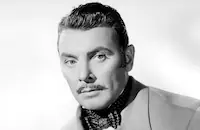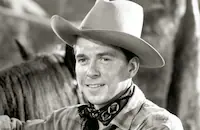Davis and Brent met while making So Big! in 1932. Davis fell for Brent, but it was unrequited. During their next film, The Rich Are Always With Us (1932), Brent was in love with the film's star, Ruth Chatterton, whom he soon married. Over the course of five more films together, Davis and Brent were both otherwise involved, so only a strong friendship developed. By the time they made Dark Victory, however, Brent was newly divorced from Chatterton, and Davis' first husband was divorcing her.
In Dark Victory, Davis plays Judith Traherne, a party-loving heiress with a terminal brain tumor. She falls in love with her doctor, Brent, and after initially worrying that he pities rather than loves her, agrees to marry him and grab whatever happiness she can in the time she has left. It's an intensely emotional role, and Davis' own emotions were then at the breaking point. Her marriage, as well as recent affairs with director William Wyler and Howard Hughes, were over. Although she had begged Jack Warner to buy the play on which Dark Victory was based, a distraught Davis was convinced she couldn't do justice to Judith, and after only a few days of shooting, begged to be released from the film, claiming she was sick. Producer Hal Wallis replied, "Bette, I've seen the rushes - stay sick!"
Director Edmund Goulding did his best to reassure her, and enlisted the help of co-star Brent. Before long, the two stars were having an affair. The film was shot in sequence, and Davis' nervous intensity in the early scenes, glowing romanticism in the middle, and serenity in the end mirrored her own feelings during the filming. Secure in her new romance, Davis claimed she was "a doll" during production of Dark Victory. But the waspish Bette Davis occasionally broke through her docility. Getting ready to shoot her death scene, Davis jokingly asked the director, "Well, Eddie, am I going to act this, or is Max?" meaning composer Max Steiner. Goulding assured her that the drama would be all hers, but Steiner's choirs of angels eventually did escort Judith into the hereafter, to Davis' dismay.
Dark Victory was a three-hanky hit. Filmgoers and critics alike knew their emotions were being manipulated, but so expertly and touchingly that they couldn't help but cheer. Both Davis' performance and Max Steiner's score were nominated for Academy Awards. As for the Davis-Brent romance, it endured through three more films onscreen, and for over a year off screen. Davis later admitted that she had wanted to marry Brent, but he didn't think it would work. But they maintained an enduring affection and respect for each other. "Of the men I didn't marry," Davis would say, "the dearest was George Brent."
Director: Edmund Goulding
Producer: Hal B. Wallis, David Lewis
Screenplay: Casey Robinson, based on the play by George Emerson Brewer, Jr. & Bertram Bloch
Editor: William Holmes
Cinematography: Ernest Haller
Art Direction: Robert Haas
Music: Max Steiner
Principal Cast: Bette Davis (Judith Traherne), George Brent (Dr. Frederick Steele), Humphrey Bogart (Michael O'Leary), Geraldine Fitzgerald (Ann King), Ronald Reagan (Alec Hamin), Henry Travers (Dr. Parsons), Cora Witherspoon (Carrie Spottswood).
BW-105m. Closed captioning. Descriptive video.
by Margarita Landazuri







































